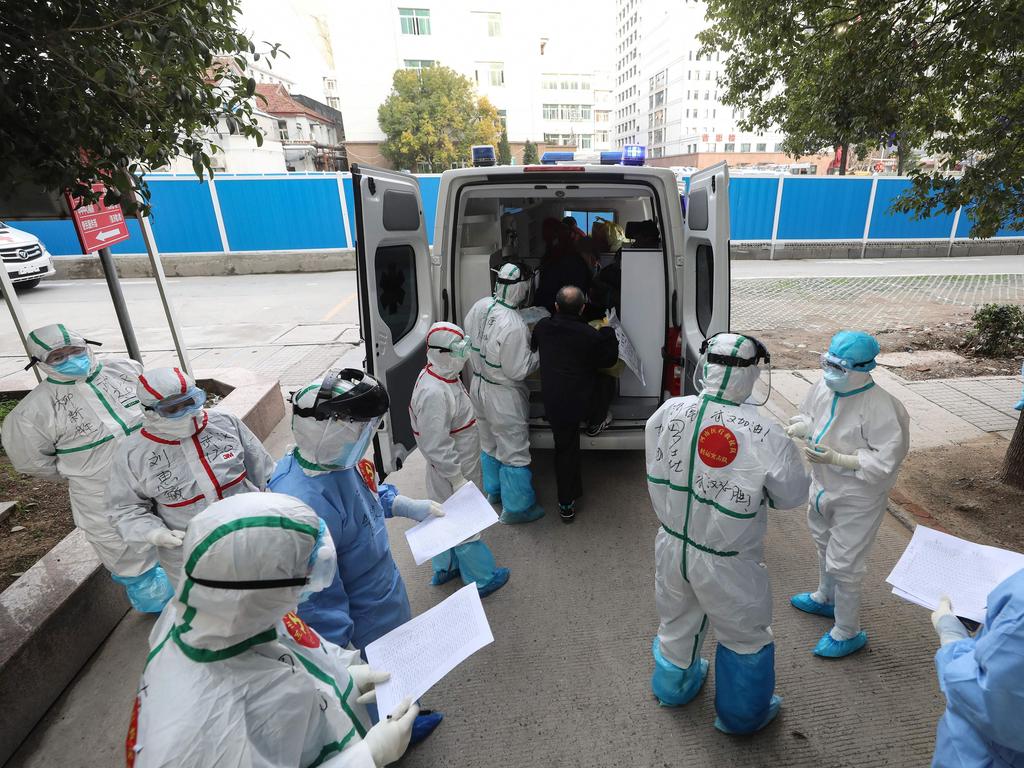‘Recovered’ coronavirus patient dies in China
China has reported discharged cases are falling sick again, after a 36-year-old died days after being allowed to leave hospital.
A 36-year-old man has died days after being discharged from hospital with coronavirus.
According to a report by Shanghai-based news portal The Paper, the man died of respiratory failure in Wuhan, five days after leaving one of the makeshift hospitals built to contain the outbreak.
The report was later removed but said Li Liang was in hospital for two weeks with mild to moderate symptoms, but was then told to go home and stay in quarantine for 14 days.
The Paper also reported discharged patients were being readmitted after getting sick again.
It said one of the makeshift facilities, Fangcang Hospital, put out an emergency notice about the newly ill patients.
Liang’s wife told The Paper he started feeling sick again two days after leaving hospital. He died on March 2.
His death certificate listed the cause as respiratory blockage and failure, caused from coronavirus.
The Guangzhou Daily reported he tested negative on two consecutive days and showed normal temperature for more than three days before he left the hospital.
The field hospitals have now started holding back discharging recovered patients after an order reportedly came from city officials. They will remain in hospital for further tests.
“To decrease the cases of reoccuring and ensure everyone fully recovers, the hospital has decided to conduct more tests,” the announcement said.
RELATED: Can you catch coronavirus twice?
RELATED: Are you worried about coronavirus? Take our poll

One patient tested positive again last week after being discharged from a hospital in Zhejiang Province 18 days ago and passing the two-week quarantine period. Another was diagnosed again 10 days after leaving hospital.
In Guangdong 14 per cent of patients have tested positive days after they left hospital, according to the provincial Centre for Disease Control and Prevention, in Xiaogan, a city near Wuhan,
The latest death has added a worrying new aspect to the spread of the infection, reports the South China Morning Post.
An expert from the Centre said Liang could have been discharged too early.
“The testing kits are not sensitive enough so it’s best to conduct three throat swab tests – one more than is the current practice – as well as an anal swab to determine whether a patient has recovered or not,” they said.
“But now there are too many patients waiting to be discharged, so there’s not enough time and doctors to perform all these tests, meaning some patients may be discharged before they’ve fully recovered.”
Jeremy Rossman, a lecturer in virology from the University of Kent in Britain, said it was possible discharge criteria were not stringent enough and more negative viral tests were needed over a longer period of time.
He said it might be useful to repeat virus testing a week or two after discharge.
Another expert said people could be getting co-infections.
“There is now data that Covid-19 can also be associated with other viral infections and that patients can then be tested positive for two viruses, for example,” said Isabella Eckerle, an infectious disease specialist at the University of Geneva.
The virus has infected more than 80,400 people in China and killed 3012. South Korea, Iran and Italy are the worst-affected countries outside China. The worldwide toll has reached more than 96,000, including 3301 deaths.
But there is some good news in China, with experts predicting there will be no more new cases in mainland China, except in the epicentre of Hubei province, by mid-March.
Daily infections in places other than Hubei have almost gone down to zero since late February.
The World Health Organisation has urged governments to pull out “all the stops” to slow the epidemic down.
The UN health agency urged all countries to “push this virus back”, a call to action reinforced by figures showing there are now about 17 times as many new infections outside China as in it.
“This is not a drill. This is not the time for giving up. This is not a time of for excuses. This is a time for pulling out all the stops,” WHO Director-General Tedros Adhanom Ghebreyesus said at a daily briefing in Geneva.
“Countries have been planning for scenarios like this for decades. Now is the time to act on those plans.”
At least 59 people have the virus in Australia, Minister for Home Affairs Peter Dutton said Friday.




